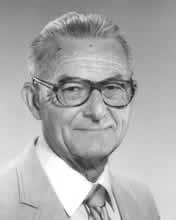

|

|
IN MEMORIAM
Wilbur H. Somerton
Professor of Petroleum Engineering, Emeritus
Berkeley
1918—2001
Wilbur H. "Bill" Somerton, professor emeritus in mechanical engineering and an expert in petroleum engineering, died February 23, 2001. He was 82.
Wilbur H. "Bill" Somerton dedicated his academic life to teaching and research in petroleum-related fields. He earned his bachelor's and master's degrees in petroleum engineering at the University of California, Berkeley in 1941 and 1943, respectively. After a year of teaching petroleum engineering at Berkeley as an instructor, he joined the U. S. Naval Reserve, returning to Berkeley in 1946 as an instructor and a student, completing his professional engineer degree in 1948. Bill joined the ranks of Berkeley’s permanent faculty that same year.
Bill Somerton’s contributions to the art and science of petroleum engineering were wide. His early work focused on a secondary oil recovery technique, in which water is injected into an oil field to displace oil. His interests in oil and water flow in porous oil reservoir rocks continued throughout his academic career. His early analyses of the potential of “water-flooding” in California were soon extended to international oil fields. Later in his career, he continued to make contributions in the understanding of methods to enhance oil recovery. Those techniques included surfactant flooding, steam flooding, and in situ combustion.
Bill’s scholarly interests also extended to the properties and mechanics of porous rocks and sand – the subsurface materials containing petroleum. Included in these analyses were predictions of subsidence and rock drilling optimization, enhanced recovery of petroleum, high-temperature properties of rock/fluid systems, and rock mechanics.
Perhaps his greatest contributions came from the combination of his interest in rock mechanics and thermally enhanced oil recovery. Bill Somerton published extensively on the thermal properties of porous rocks and gained an international reputation as the expert on that topic. His experiments on the thermal conductivity of sand containing both water and gas led to the discovery of “the heat pipe effect”, the movement of steam and water that gives rise to energy transport rates that are orders of magnitude greater than that of water-filled rock itself.
Bill Somerton also made significant contributions outside of petroleum engineering science. While on the faculty, he helped found the Mathematics, Engineering, Science Achievement program (MESA), designed to help underrepresented minority students prepare for careers in engineering and science. That program grew to significant scope, helping hundreds of students prepare for careers in engineering that would otherwise have been closed to them. He was appointed assistant dean for minority student affairs in 1981, taking on responsibility for all matters associated with recruitment and retention of undergraduate women and minority students in the College of Engineering. He also chaired the college committee on minority student affairs.
His dedication to petroleum engineering was extraordinary. He was the lone hand in maintaining the petroleum program in the Department of Mechanical Engineering for many years. He was solely responsible for the training of hundreds of petroleum engineers passing through the department. His generosity in helping petroleum engineering students was legendary in the petroleum profession.
After Bill’s retirement in 1987, he remained active in both his research and work on social issues. Characteristic of Bill’s willingness to do what he could to contribute to important causes, he walked hundreds of miles through what was then the Soviet Union to promote world peace and international understanding.
Kent S. Udell
George Cooper
Clayton Radke
Paul Witherspoon